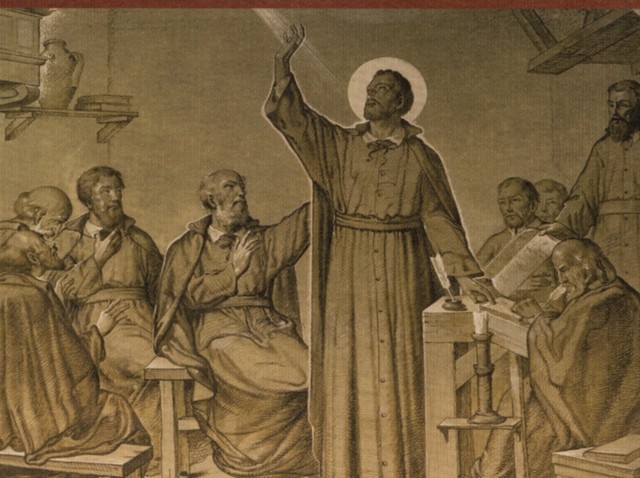
In 2019 we celebrate 450 year from the birthday of our Congregation. The Brief “Iniunctum nobis” (“It was commanded to us“) dated 6 December 1568 by Pope Pius V granted the Company of the Servants of the Poor the faculty of taking solemn vows, and enrolled it among religious orders.
Apart from its juridical language, this document conveys the anxiety of the Pope — as if it was an obligation flowing from his mission — to ensure that our charism would be forever present in the church, with its care, upbringing and education of orphans, taking into account each one’s abilities. At that time in history, the formation of several seminaries instituted by the Council of Trent was added to our charism’s impact.
It is clearly stated that the new Congregation originated in the lay man Jerome Miani, a Venetian nobleman animated by great love for God and, according to the understanding of believers, moved by the Holy Spirit. Previous events are recalled: the approvals by Pope Paul III (1540) and Pius V (1563); the donation of the church of St. Maiolus in Pavia with some revenues related to it by Card. Charles Borromeo (1566); the charitable activities in favor of orphans being carried out in various Italian cities, like Genoa, Milan, Ferrara.
The document of St. Pius V intends to end the uncertainty of many priests, clerics and lay men of the Company who, despite their virtuous behavior, did not perceive themselves as perpetually bound to the institution because they were unable to publicly and solemnly take their religious vows, and therefore looked for alternate solutions.
The Pope grants therefore willingly the faculty of taking — publicly and no longer privately —the three vows of chastity, poverty and obedience in the hands of church prelate of their own choice. They would then elect their own Superior General as their leader.
The Servants of the Poor acted immediately: on 28 April 1569 they gathered in the house of St. Martin in Milan. They were twenty priests, three clerics and eleven lay men.
On 29 April the first six priests took their solemn vows in the hands of the Bishop of Tortona, Mons. Cesare Gambara. They were Fr. Angel Mark Gambarana, Fr. Vincent Trotti, Fr. Francis Spaur, Fr. John Scotti, Fr. Reginald Vaini, Fr. Bernardine Castellani. Fr. Angel Mark Gambarana was elected first Superior General. He was one of the most active companions of St. Jerome and the moral guide of the Company after the death of the Saint.
A constitutional text was necessary. With suitable and meaningful amendments and additions, a few paragraphs of the Constitutions of the Barnabites were adopted. All in all, 14 paragraphs about vows and norms of common life. Nothing was there about the governance of our Congregation, because we had our own rules.
A spiritual exhortation was added to the brief text of the Constitutions. An examination of the contents shows that it was delivered by one of those who were about to take their vows and welcome the text of the early rules. Tradition attributed it to Fr. Angel Mark Gambarana.
It is of great significance even for us today. It retains all the freshness and passion of our early confreres who consecrated themselves to the Lord and at the service of the Church through their solemn vows.
I offer a translation of mine so that we may take on the sentiments that were alive in our early religious on that 29 April 1569. They concern the binding strength of the vows, the personal and ecclesial responsibility of religious profession, the goal of the Congregation, intimacy with Christ and our total belonging to him, our concrete love for God and for our brethren, our veneration for the founders of Orders, our joyful sense of gratitude to the Lord, who binds us to himself in spite of our limitations.
Exhortation to take the vows
“If we strongly wish to be worthy of praise in the sight of God, useful to the whole Church, ready to help every person, it is our duty to do everything with awareness and prudence.
Even Peter, the Prince of Apostles, warns us to be prudent, trained, sensible, cautious and vigilant in every action, when he says, “be prudent and vigilant” (1Pt 5:8). To sum up: he who sleeps is, so to say, dead and does not do any actor at all; in the same way a person who is imprudent, inexperienced, senseless, and impulsive, is compared to an animal that has no understanding.
Therefore, my dearest brothers, we are all admonished to take in full awareness, with the help of God infinitely good, the step we are about to take, so that our vows may be observed with the utmost rigor: let us recall ever more in the intimacy of our heart the scope of religious Congregations and their founders.
In fact, they understood themselves as so bound by their vows that not even priests and Popes would be able to release us from them. If it is a sign of piety to believe the holy doctors of the Church, a vow is more binding than an oath taken in a tribunal; we therefore clearly know that we would be much more seriously guilty than if we did perjury — more than violating a true oath — when we would entrust our heart to any creature in full purpose and freedom, after we consecrated it to God once and forever.
Our Congregation was instituted for this purpose, and all religious constitutions have this goal: humility of religious life and poverty of both, spirit and temporal goods. In fact, we will have to love God with predilection in an extraordinary way, and to love our brothers as ourselves, and this with a humble and mutual demonstration of charity.
Finally, we will have to renounce every property of ourselves, of any thing, as well as of our will.
Furthermore, no one, with the exclusion of God alone, will be allowed into our interior little house, on which the light of His face was impressed so that He may more easily give us the strength to embrace Him and possess his delights.
Dearest ones, this is certainly the scope of our Congregation, this is its goal, this its thinking, this its will. Sacred orders, congregations, all monasteries, all virtuous forms of life were instituted to this end.
This is the goal of our rules and constitutions: the more they concern us, the more they are to be embraced with greater ardor.
For this reason, let us take our vows to God, as if to the Greatest Good! However, if we will not keep the following rules with all our strength, we will be perjurers and will break our pact of faithfulness with God. If instead, we will keep them carefully, we will imitate Sts. Augustine, Benedict, Bernard, Francis, Dominic: to sum up, the founders of many congregations, saints that are lights shining in every part of the earth.
By means of conclusion, dearest brothers, let us strive with all passion, diligence and commitment to keep these particular constitutions without forgetting the words of the Psalmist Prophet who says: “Take vows and keep them” (Ps 115:14), and let us thank God profoundly, he who deemed worthy to bind us, poor creator ng his servants.”
Fr. Giuseppe Oddone crs
Vicar general
